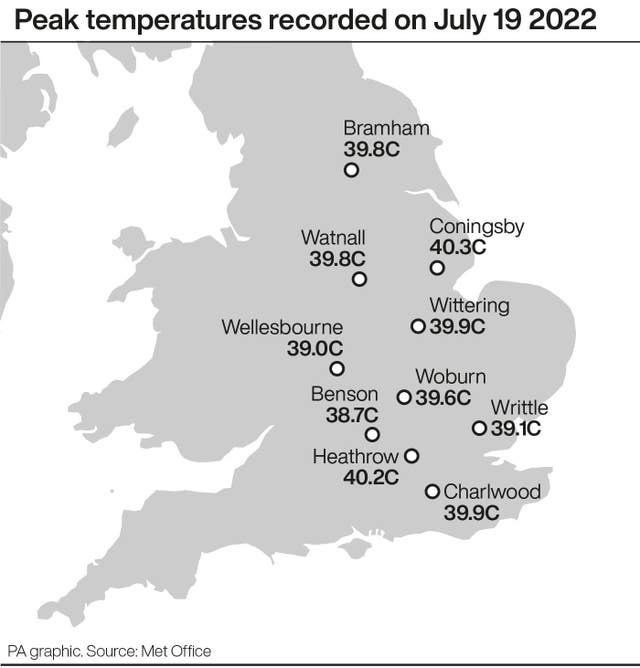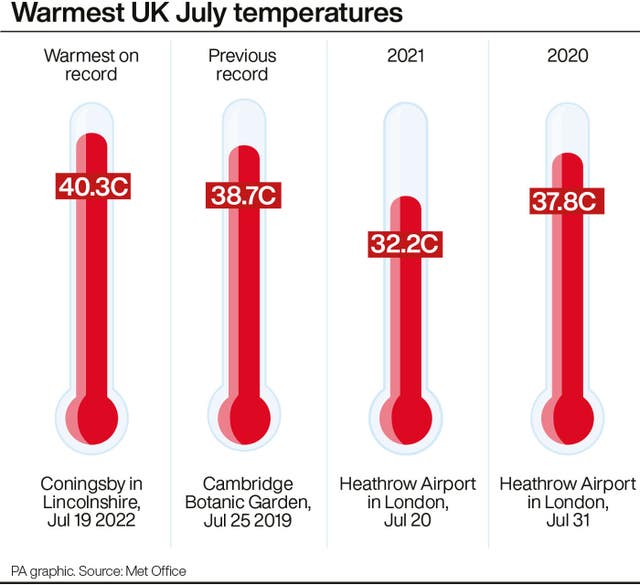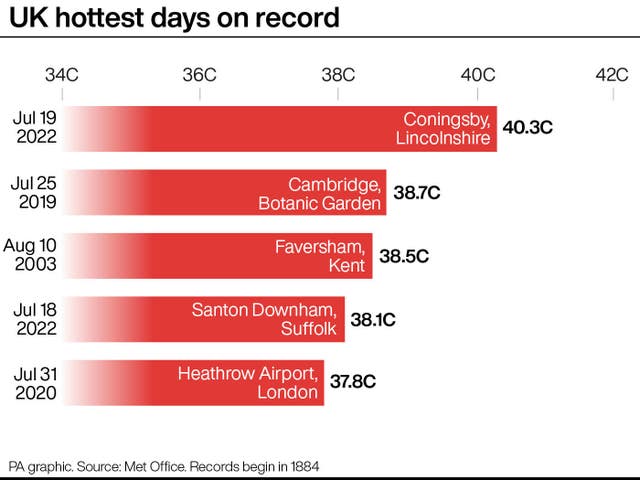UK temperatures soar above 40C for first time with transport chaos and fires
New record temperature of 40.3C were provisionally recorded as scientists warned it would be ‘virtually impossible’ without climate change.

Temperatures have topped 40C in the UK for the first time ever, as the sweltering heat fuelled fires and widespread transport disruption.
A new record for the hottest day ever seen in the UK, of 40.3C, was provisionally recorded in Coningsby, in Lincolnshire, beating the previous record of 38.7C in Cambridge three years ago, by 1.6C.
A total of six sites, mostly in Greater London, saw temperatures reach or exceed 40C.
Scotland has experienced its hottest day on record, with the temperature reaching 34.8C in Charterhall in the Scottish Borders, Met Office provisional figures showed.

Nine people have died since Saturday in swimming accidents and there has been widespread disruption to train services.
As temperatures soared:
– Interim deputy chief executive of NHS Providers, Miriam Deakin, said the heatwave was forcing hospitals to scale back the number of planned surgeries and install cooling units and try to cool down IT server rooms.
– An East of England Ambulance Service spokesman said the service had seen above-average call numbers since Monday afternoon and it expected to still be seeing an impact from heat-related illness into the weekend.
– Road congestion in several cities, including Birmingham, London and Manchester was down on Tuesday, as people heeded advice not to travel, while commuter numbers were also down on the Tube and bus services in the capital.
– The record heat came after the UK endured its warmest night on record, with temperatures remaining in the mid-20s in some places.
– Sales of fans, ice cream and paddling pools and burgers rocketed as the heatwave sparked a spending spree on summer essentials, according to retailers, while tech experts urged smartphone users to keep their gadgets out of the sun to ensure they continue working properly.

The Met Office’s chief scientist Professor Stephen Belcher warned temperatures would get more extreme in the future, and the only way to stabilise the climate was to cut greenhouse gas emissions to net zero.
The UK is experiencing record heat as much of Europe bakes in heatwaves that are fuelling wildfires in France, Spain and Portugal.
On Monday, Essex County Fire and Rescue Service received three times its average number of calls, driven by wildfire reports, while a blaze at Lickey Hills Country Park near Birmingham, spread to around 50,000 square metres and forced 15 people to flee their homes.
Around 100 firefighters and 15 engines tackled the blaze in the village of Wennington on Tuesday afternoon, with television footage showing black smoke billowing into the air, with buildings and fields on fire, while people were evacuated, horses were taken to safety and the nearby rail line was closed.

He warned: “Climate change is increasing fire danger across the UK, and we need to be prepared for it.”
Trackside fires and damage to overhead lines also halted train services, while there were widespread suspensions, disruptions, reduced services and temporary speed restrictions to cope with the risk of buckling rails.
Transport Secretary Grant Shapps conceded the UK’s transport network cannot cope with the extreme heat, saying that the Victorian-era infrastructure “just wasn’t built to withstand this type of temperature” and it would take decades.
Nine people have died or are feared dead in accidents in open water since Saturday, including several teenagers, and a swimmer who was missing at sea after an incident close to Clacton pier in Essex on Tuesday.

It will be fresher for most places on Wednesday, although some parts of East Anglia will still see temperatures reach as high as 30C.
Wednesday’s rain, where it occurs, will be much heavier than on Tuesday, with a risk of localised surface water flooding, the Met Office said.





